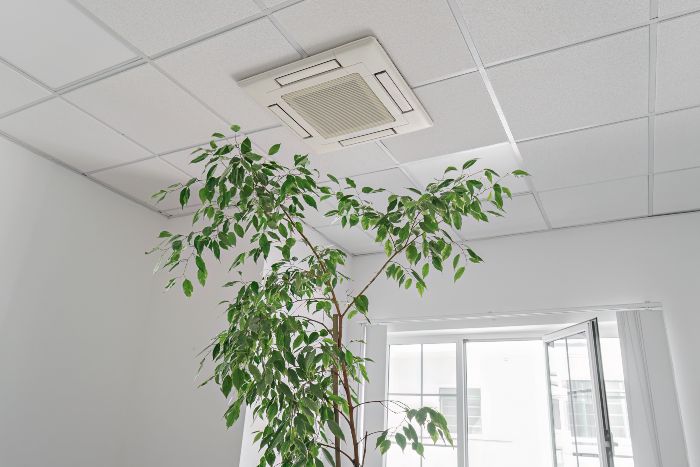Read about HVAC & Indoor Air Quality

Indoor air quality affects your comfort at home in many ways. The temperature, particle content, and moisture levels of your air all contribute to its breathability, as well as the feel of the climate inside your home. Your HVAC system is one of the key players in the quality of your Omaha home’s indoor air, helping you to maintain the environment you want through various functions. Because your HVAC system is so important in terms of indoor air quality, maintaining an efficient heating and cooling system is a positive step toward cleaner and healthier indoor air for your family.
Temperature
Temperature is a significant factor in the comfort of your home’s living spaces. When the temperature is too high or low, it’s easy to feel irritated and lethargic. Your HVAC system helps you control the temperature of your indoor environment by providing heated or cooled air as needed. Keeping your HVAC system clean with regular professional maintenance and ensuring your ductwork is in good shape are the best steps you can take toward improved temperature control. If your home is large, options such as HVAC zoning can help to funnel heated and cooled are to the areas where you need it most, bypassing unused spaces for improved efficiency and reduced energy consumption.
Humidity
Your HVAC system also affects the humidity levels in your home. Both furnaces and air conditioners tend to dry air out during the conditioning process. In the summer, this effect is often desired, as warmer air holds more heat and can make your home feel warmer. High humidity can also prompt mold growth or cause wallpaper to peel and wood surfaces in your home to expand or warp. However, in the winter, dry air can feel colder and cause irritation to the skin, eyes, nose, and throat. Low humidity can also damage your home’s finishes, causing wood to crack and paper products to dry out. Humidifiers and dehumidifiers can be integrated into your central HVAC system for added convenience and comfort—using these systems as needed can add or remove moisture from the air for finer humidity control so you can enjoy an indoor living space that’s exactly as you want it to feel.
Particulate Matter
Air contains microscopic particles that include dust, pollen, animal dander, bacteria, viruses, and mold spores. Poor ventilation or certain lifestyle practices can increase particulate matter in your home’s air, which can cause surfaces to become dusty more frequently and exacerbate respiratory conditions such as asthma and allergies. Your HVAC system is your first line of defense against the particles in your air—the system’s air filter screens out many of these particles to keep your HVAC system, your ducts, and the air you breathe, much cleaner. However, basic air filters don’t address all types of particulate matter, often allowing extremely small particles through. Purchasing air filters with a higher MERV rating can increase their efficacy, but you should check with your HVAC service to ensure your system is compatible with the type of filter you choose. If you’re still concerned with airborne pollutants or allergens, talk to your HVAC service about installing an electrical filter or UV lamp to eliminate additional health concerns for healthier air at home.
Your Omaha HVAC contractor can help you achieve a healthier indoor environment with HVAC services and accessories to meet you every need. You can reach us via our websitefor additional information or to schedule an indoor air quality consultation, or find out more about the factors that affect indoor air quality on our HVAC blog.
